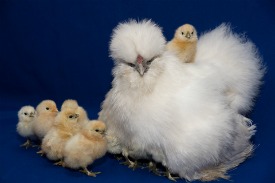Breeding Chickens
There are a number of reasons that breeding chickens might be something you’ll want to do. Perhaps accidentally or intentionally you already have
Maybe you'd like to raise a clutch of fluffy chicks to add to your flock, your hens are getting older and not laying as much, could be there’s a special breed you’d like to work with and possibly improve or you want to start raising or replacing chickens to be killed for meat.
Breeding and raising domesticated chickens is a human habit dating back 8000 years. Welcome to Raising-Chickens.org where we will condense such a long history of work into something simple and enjoyable for anyone interested.

It’s easy to keep chickens healthy and safe if you know what to do for them and are prepared before bringing them home. You will want to invest in a good chicken coop or convert an existing building to suit the size and purpose of your flock.
Since I'm often asked about how to build your own coop I took the time to preview a couple coop plan resources.
If you're looking for a quality set of chicken coop plans then take a look as I narrow it all down.
Click the image below to read the review..
When breeding chickens be prepared. Even if you free-range your chickens you should still have a good size yard attached to the chicken coop.
If you plan to raise young chickens while keeping adults, separate housing may be needed until the young chickens reach adult size. A few separate pens or large wire cages can help.
If you keep one of the rarer poultry breeds then breeding is important to maintain that breed. It’s the individual fanciers of some breeds that have kept them thriving through centuries.
Some rare breeds are actually facing extinction. The good news is that no matter why you need or want to breed, it's not hard to produce more chickens. Let's take a look at breeding chickens.
There are several chicken breeding methods, from isolating individual hens and roosters for selective breeding to just letting the roosters and hens live together.
If you have a mixed flock that lays different colored eggs, you may be able to use different roosters at different times and only incubate the purebred eggs from hens of the same breed as the current rooster. This can take less space while keeping your main flock together.
Roosters can be rough on hens. Sometimes the spurs of the rooster or his feet will cause feather loss on the hens’ backs. There’s a great product called: “hen saver” that has been helping many hens be more comfortable during breeding. Feeding chickens well is always important, but hens that lay and spend weeks sitting on eggs need to be in the best shape possible.
That way, you'll know that they'll stay in good health, even though they're producing eggs or sitting on them and not eating often. Once you have fertilized eggs, you'll need to incubate them.
Natural incubation is the oldest form of breeding chickens. A broody hen will eventually claim a clutch and incubate them to hatching.
She probably won’t care if she or another hen laid the eggs. A good brood hen will carry out her duties with single minded focus only leaving the nest once or twice a day to relieve herself, stretch, have a bite to eat and a good drink of water.
Once the chicks hatch she will hover over them protectively, keep them warm and teach them as they grow.
You may want to keep brooding hens separate from the rest of the flock in an area designed for raising chicks. Some hens can be rough on another hen’s chicks.
Artificial incubation is another option. After all, hens are only broody at certain times of the year. For breeding chickens commercial incubators will remain at the correct temperature and bring your chicks to hatching.
Sometimes it’s possible to “graft” an incubator clutch of day old chicks under a broody hen at night.
The chicks will snuggle to her warmth and in the morning she will likely believe all her eggs have hatched. This doesn’t always work so have a warm brooder ready.
Keeping pedigree records will help you prevent inbreeding and will ensure that you'll have healthier chickens that will produce longer.
If you are working with a specific pure breed, bringing in a new and unrelated rooster every year or two will prevent inbreeding also. Take the time to plan your breeding, and you're sure to avoid many problems.
To learn about production bred chickens go here.


New! Comments
Have your say about what you just read! Leave me a comment in the box below.